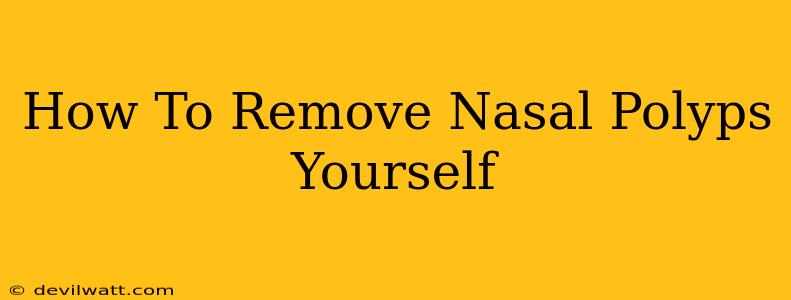How To Remove Nasal Polyps Yourself? (Proceed with Caution!)
Disclaimer: The information provided in this article is for informational purposes only and does not constitute medical advice. Attempting to remove nasal polyps yourself is strongly discouraged and can be dangerous. Always consult a medical professional for diagnosis and treatment of nasal polyps. Serious complications can arise from improper self-treatment.
Nasal polyps are benign, noncancerous growths in the nasal passages. While they are generally not life-threatening, they can significantly impact your quality of life, causing symptoms like congestion, loss of smell, and facial pain. Many people search for ways to remove nasal polyps at home, but it's crucial to understand the risks involved.
Understanding Nasal Polyps
Before discussing (and strongly advising against) self-removal, it's important to understand what nasal polyps are. They are soft, teardrop-shaped growths that form in the lining of your nasal passages and sinuses. They develop due to chronic inflammation, often linked to conditions like allergies, asthma, or cystic fibrosis.
Why You Should NOT Attempt Self-Removal
Serious Risks: Attempting to remove nasal polyps yourself, using any method, carries significant risks, including:
- Infection: Introducing bacteria into the nasal passages can lead to serious infections.
- Bleeding: The nasal passages are highly vascular, and self-removal can cause significant bleeding, which might be difficult to control.
- Damage to Nasal Structures: Improper removal techniques could damage delicate nasal tissues, leading to long-term problems like scarring and impaired breathing.
- Incomplete Removal: You may not be able to remove the entire polyp, leaving behind fragments that can regrow or cause further issues.
- Exacerbation of Symptoms: Improper removal can actually worsen your symptoms and cause more irritation.
Safe and Effective Treatment Options
The only safe and effective way to treat nasal polyps is through proper medical intervention. Your doctor will likely recommend one or more of the following:
- Medications: Corticosteroid nasal sprays or oral steroids can help reduce inflammation and shrink polyps.
- Surgery: For larger or persistent polyps, surgery may be necessary. This can be done using minimally invasive techniques, such as polyp removal with specialized instruments.
When to See a Doctor
If you suspect you have nasal polyps, or if you're experiencing symptoms like persistent congestion, loss of smell, or facial pain, it's crucial to schedule an appointment with an ear, nose, and throat (ENT) specialist. Early diagnosis and proper treatment are key to managing nasal polyps effectively and avoiding potential complications.
Home Remedies for Nasal Congestion (Not for Polyp Removal)
While you should never attempt to remove nasal polyps yourself, some home remedies can help alleviate related symptoms like congestion:
- Saline Nasal Rinse: A saline rinse can help clear nasal passages and reduce irritation.
- Humidifier: Using a humidifier can add moisture to the air, helping to thin mucus and improve breathing.
- Steam Inhalation: Inhaling steam can help loosen mucus.
Remember, self-treating nasal polyps is extremely risky and can lead to serious health problems. Always consult a healthcare professional for diagnosis and treatment. Your health is too important to risk.

